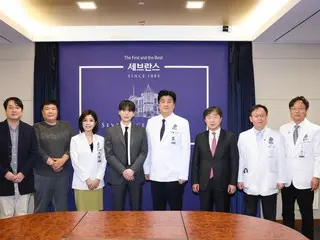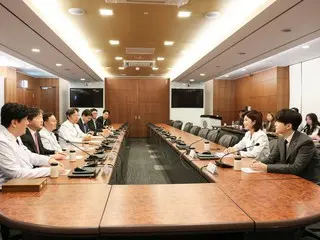On the 23rd, Severance Hospital held a groundbreaking ceremony for the 'Min Yoon Gi Treatment Center' on the first floor of the Jejun Building, which will provide treatment for children and adolescents with autism spectrum disorder. The center will provide language, psychological, and behavioral therapy to support the mental health of children and adolescents, and will operate a variety of programs that combine clinical practice and research.
SUGA has consistently shown a keen interest in mental health, psychological and behavioral issues, and particularly depression in adolescents, even during his group activities. He has been exploring ways to help through his musical talent and abilities.
Last November, SUGA began communicating with Professor Jung Gun-ah of Severance Hospital's Department of Child and Adolescent Psychiatry, an authority in the field of child psychiatry. After several meetings, it became clear that individuals with autism spectrum disorder require customized treatment tailored to their life cycle, but existing short-term therapeutic interventions often fall short of achieving this. Additionally, they agreed that the construction of a specialized treatment center capable of supporting long-term treatment spanning over a decade is necessary to bring about positive changes in symptoms of autism spectrum disorder. SUGA announced his intention to donate 50 billion won (approximately 500 million yen) to Severance Hospital. This donation marks the highest amount ever contributed by an artist through Severance Children's Hospital and Yonsei University Medical Center.
Furthermore, Professor Jung and SUGA discussed the construction of the treatment center and music-based social skills training for children and adolescents with autism spectrum disorder from late last year to early this year. Based on these discussions, they developed the “MIND” program, a social skills group program that integrates musical content into existing social skills training programs.
The acronym “MIND” stands for “enhancing music-based interaction and sensory experiences (Music), engaging in opportunities for social relationship formation and communication (Interaction), learning the process of naturally forming connections through a community (Network), and respecting individual diversity and learning to coexist in society (Diversity).” Children participating in this program play instruments, sing songs, create sentences to music, and express their emotions and thoughts through music and sentences.
SUGA met with children with autism spectrum disorder on weekends from March to June this year and participated in the program development. While playing instruments such as the guitar, he guided the children to synchronize rhythm and harmony, interact through music, and expand their emotional expression. He also taught the children how to play instruments directly.
As the program progressed, the children's emotional and linguistic expressions increased steadily, and their social skills were trained through cooperation and waiting with other children. Oh (10 years old) and Lee (12 years old), who did not show active responses when receiving only speech therapy, demonstrated their talent for selecting instruments and playing in time with the beat.
They also demonstrated diverse emotional expressions through ensemble playing. Kim (18 years old), who plays the saxophone, had almost no language or emotional expression, but he expressed emotions through facial expressions when collaborating with other children and responded to the therapist's attention and praise.
Through this program, we confirmed its effectiveness in helping children with autism spectrum disorder, who have limited language abilities, form social relationships.
In the future, the Min Yoon Gi Treatment Center plans to advance the MIND program and establish an independent music project model. To ensure the program's sustainable operation, we will also systematize training courses for specialists in each treatment field to strengthen the program's sustainability and expertise.
Once construction of the Min Yoon Gi Treatment Center is completed in September this year, regular program sessions will be expanded and newly established. The center will operate a variety of treatment sessions, including music-based social skills training, targeting individuals with autism spectrum disorder and other developmental disabilities. Existing programs such as ABA (Applied Behavior Analysis) and speech therapy will also be expanded. Additionally, to objectively validate the effectiveness of the MIND program, the center will promote clinical research, academic paper publications, and the issuance of program manuals.
Professor Jung Gun-ah stated, "Beyond financial support, I sincerely thank SUGA for the heartfelt talent donation and volunteer activities he has demonstrated over the past few months. I was deeply impressed by SUGA's consistent serious and intelligent attitude. The ultimate goal of the Min Yoon Gi Treatment Center and the MIND program is to help children with autism spectrum disorder grow into independent and healthy members of society through music, and through this, to eliminate prejudice against those with autism spectrum disorder and improve understanding of the condition."
SUGA shared, “Through the preparation and volunteer activities for the program over the past seven months alongside Professor Jung Gun-ah, I deeply felt that music can serve as an important channel for expressing emotions and communicating with the world. The opportunity to participate in the treatment of children with autism spectrum disorder itself is a great source of gratitude and happiness, and I aim to continue providing support to enable more children to become active members of society.”
2025/06/23 10:03 KST
Copyrights(C) Herald wowkorea.jp 5










